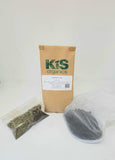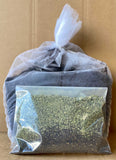FREE SHIPPING!
KiS Compost Tea Brewing Kits are easy to use, reliable and microscope-tested. 100% natural and a great organic alternative to chemical pesticides, herbicides, and fertilizers.
Compost tea is used as a probiotic application, giving your plants greater resistance and ability to fight off pathogens. Compost tea increases nutrient cycling and water retention, helps to extend root systems and has been show to break down toxins in the soil and on plants. Overall, using this in your garden will increase plant health and can even enhance the taste of your fruit and vegetables!
We have designed our tea kits to use in an ACT (Aerated Compost Tea) process which involves taking water, compost and a food source in a container and adding oxygen via an air pump. Applying ACT is much easier than applying compost and will give you higher levels of active microorganisms than you would see in compost alone.
Each one of our kits contains high-quality compost, and foods to enable microbial growth. We have taken great care in our tea production and our recipes have taken years to develop in order to maximize the biodiversity of our final product. In-depth research and extensive testing mean we can guarantee consistently high numbers of beneficial microorganisms in every brew.
WHAT IS INCLUDED
The KiS Organics Compost Tea Brewing Kits come in a single, 3, 5 or 10 individually portioned and packaged brew kit to produce 5 gallons of compost tea or in a single or double brew option for 50-gallon batches (tea brewer system not included).
INSTRUCTIONS FOR BREWING
1. Fill the 5-gallon bucket or 50-gallon container with rainwater or de-chlorinated water. Ensure you have a quality aeration motor to maintain adequate dissolved oxygen levels for microbial growth.
2. Use one kit for one brew: Drop the mesh bag into the bucket, sprinkle in the loose bag of foods, run your brewer aeration system for 18-36 hours, and you're done!
We recommend you apply your compost tea within 4 hours of taking it off of aeration.
Need more than 5 gallons of brew? We recommend brewing the tea in the 5-gallon bucket, and then diluting as needed for the application. We also offer our 50-gallon microbulator and kits for larger applications.
Don't have a brewer? Check out our 5-gallon Mini-Microbulator or our 50-gallon Microbulator.
Click here for detailed instructions.
APPLICATION
ACT can be applied both as a foliar application to the leaf surface of the plant or as a soil drench. We typically do a combination of both by soaking everything.
The simplest way to apply the tea is to use a watering can or just dump the tea right at the base of the plant. If you have a larger area to cover you can use a sump pump with a hose attached. While you shouldn’t brew with an impeller pump (sump pump), Tim Wilson has shown with his microscope work that one pass through the pump does minimal damage when used to apply ACT.
One important consideration when looking to spray ACT is to remember that the tea is alive. That means you want a larger droplet size and lower pressure, sort of a “rainbow” effect when spraying the tea.
For first time users in a garden, outdoor landscape, or farm, we do 5 applications (of about a pint per plant used as a soil drench) throughout the growing season. Some gardeners and growers apply teas at rates ranging from once per week to 3x for the entire year. You’ll need to determine what works best for your garden based on plant response, labor, and cost.
To learn more, check out our Ultimate Compost Tea Guide
STORAGE
The Compost Tea Kits should ideally be stored in a cool and moist environment such as a basement. The refrigerator or freezer is a bit too dry for storage.
An issue you may face will be the compost drying out. We would suggest just adding a bit of de-chlorinated water on the compost every now and then to make sure it stays moist, at about the consistency of how your soil might feel a few hours after watering it.
RESOURCES
Gardening with Microbes - Making Better Compost Tea
Gardening with Microbes - The Importance of Water Quality
Gardening with Microbes - An In-depth Look at Tea Brewing Methodology: Part 1
Gardening with Microbes - An In-depth Look at Tea Brewing Methodology: Part 2
Microbe Organics - Tim Wilson Focus on Microscopic Aspects of Compost Teas














